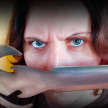Vessels (Part 1)
A daily fantasy serialization.

Seven years had passed since the embalmer raised the dead, and now it was time to send them out west after all their hard work. It was only right and proper.
Jeshed stood in front of a large bronze mirror, looking grave and austere just like a priest should. His head was completely shaven, as suited a man; and though his beard was gray, it was immaculately braided. He smoothed down the front of his long white robe and took up his symbol of office. The thin black heqa scepter was nearly as tall as him, with two prongs on the bottom while the top end was a curious wedge shape, like a stylized jackal head. After long years of work, his hands had worn down a section of the rod to be smoother than the rest of it.
He ran through the words of the Ritual of Going Forth in his mind. It was easy to forget the intricacies of everything involved but, luckily, a few parts were unforgettable. The river would rise and turn black and then he would send the dead out west.
“The people are waiting, Jeshed,” the elderly priest behind him said. It was the other’s advanced age that had first guilted Jeshed into carrying out the ritual. Eshmedi was the eldest priest at Uftem Temple and the most venerated for his wisdom and insight. A dark patch of rough, crisscrossing scars covered the lower left side of his face. Eshmedi had been burned for as long as Jeshed could remember. He smeared ashes down the middle of his face, another symbol of his profession, and he left the temple to face the people.
Two groups stood at the riverbank. One group, the villagers, fidgeted anxiously. They were thankful for the brief break from the fields to participate in the important ritual, but they didn’t know what to do or where to stand. The other group, those in plain bronze masks, stood nearby, unnaturally still in comparison.
Jeshed raised the heqa scepter over his head, gesturing for silence. It was not needed. There was something about the time and place that compelled the townspeople to be silent. A weighty significance muted the lips of every person who had come to see.
“Nephtet-Ka was the greatest and wisest pharaoh in the long history of Khemeret,” Jeshed began.
“Hail, Nephtet-Ka!” the crowd replied dutifully. An inky black stain began to seep over the surface of the great river, like a liquid blight, thick and sticky like tar. It smelled faintly of cinnamon with a subtle note of decay underneath it.
“He went out into the desert to fast and pray, seeking favor from the gods.” The priest’s voice grew stronger as he went. “Instead, he found death! His entourage was beset by bandits, leaving none alive…save for the pharaoh.”
“Hail, Nephtet-Ka!” the crowd shouted.
“He found Enu-Bal, the Final God, who taught him the secret of the khemu, the blackness in the river. He taught our greatest pharaoh that it was good and right to keep the dead, to have them toil until the next black flooding. He gave our pharaoh mastery of the dead and the gift of the covenant, for all men must serve!”
“Hail, Nephtet-Ka!” the crowd shouted.
“But when our pharaoh returned home, he found he had been presumed dead. His throne had been taken by the patriarch of the Amak-su-phet, that red-haired pack of traitors!”
“Traitors!” the crowd screamed.
“Rich and powerful were the Amak-su-phet. Their money pouches had grown fat from the sale of the living. But in their greed, they sought to own even the kingdom! They had hired the bandits to attack Nephtet-Ka in the desert!”
The crowd hissed.
The priest’s voice lowered. “When he slew the red-haired dog, he did so with a clear heart.”
“Hail, Nephtet-Ka,” the crowd murmured, more quietly this time.
“The Black Pharaoh liberated every slave in his kingdom. And great was he in his mercy, that he let the rest of the Amak-su-phet live. They had no hand in the betrayal though their wickedness was clear. Each of the family would serve alongside the dead for seven years, for they had profited from the misery of the living.”
“Hail, Nephtet-Ka!”
“The iniquitous Amak-su-phet served their years but instead of being thankful, they sought revenge. They fled to Alvara, to their Emperor, telling the foreign ruler of the power of Nephtet-Ka. The Alvari set upon our lands and our pharaoh, burning his body so that he might never rise and go west! They remain to this day, our infidel masters!”
The priest had whipped up the crowd into a frenzy. They howled and screamed in fervor, while the masked ones remained still.
“But so great and powerful is Nephtet-Ka,” the priest continued. “That he promised he would return to his people when they needed him most. He will be borne on the black waters of Neferamtat and lead us out of persecution!” The priest raised his scepter once more and looked to the sky. “Nephtet-Ka, we send out our worthy dead who have served for so long back to Enu-Bal.”
Jeshed swept his scepter westward, and all as one, the dead began lurching towards where the sun went to die every night. He turned his attention to one fellahin that strayed behind the rest, as though it did not want to go. His assistant had served him for seven good years, but it was time to send it on its way. The fellahin’s limbs dangled skeletally at its sides and its ribcage stood out starkly beneath its leathery skin. It wore a simple skirt around its narrow waist and bangles about its arms and wrists. Fully covering its head was an expressionless bronze mask, plain but for one groove down the center of its face.
“The Seven Years of Toil is done,” Jeshed said to it, “Go now to Khem-Seshen. Dwell forever with Enu-Bal in quiet shade.”
He watched the creature finally start to amble west, to join the slow migration of the dead. The fellahin that now lurched over the hill were too many to count and darkened what should have been a blindingly bright sand dune. No two looked the same. Some came from wealthy families; others came from poverty. Some bore dyed leather chest pieces and fierce snarling masks; others wore hardly anything at all. Some were ornate; others were plain, but they all went west.
Everyone went west eventually.
Suddenly, shouting came from the direction of the river. The villagers ran down to the riverbank and pulled something out of the water. One of the larger men, a fisherman, waved to Jeshed, gesturing to come see.
“Get away from there!” Jeshed shouted. He could not hear his reply, but the man continued to wave frantically. Cursing, Jeshed hitched up his robe and went down to the gathering. The men had circled around a wet miserable pile of something, their wives and mothers clustering around them.
“Make way, you fools!” Jeshed growled and pushed his way through. He finally saw what was causing the panic. A little girl lay in the sand, motionless and covered in the thick black pitch of khemu. She looked to be no older than ten. She was clad in a simple linen tunic and wore but one sandal. She was thin with brown skin and thick black hair that dripped with the viscous substance of the river.
“Help me carry her away,” Jeshed ordered. The big fisherman obliged and picked her up like she was a kitten. Together they all retreated from the river.
Jeshed had seen plenty of bodies washed up on the riverbank during his time serving at the Uftem temple and, as his duty entailed, he had tended bodies of all conditions and prepared them for the afterlife. The Neferamtat river was home to huge, voracious, and aggressive crocodiles who did not care if their next meal was an antelope or a human. If they left behind anything of a person, it wasn’t much.
Too many of the washed-up bodies had been casualties of the Alvari Empire’s efforts to maintain their order in a land that did not want them. Some had been killed during frequent riots and others had been felled during raids. The sacred river had even become the final resting place of criminals who had been sentenced to crucifixion; their bodies were thrown in the river like garbage. It was sad, certainly, and every Khemari heart ached to see the river treated as such but it was the way of things now. Jeshed had quelled his anger long ago. Only the embers of a quiet resentment remained though they flared at the sight of the lifeless child.
He saw she had no wounds, by sword or by teeth. He couldn’t believe she drowned even though that wasn’t impossible. The river was known to be wild and turbulent in places and it was notorious for its undertow. He furrowed his brow as he moved to her feet. They did not appear blackened or discolored and she was not bloated or swollen anywhere. He opened her mouth and while the jaw was difficult to pry, he saw none of the froth usually present in a drowned body.
“Is…is she dead, Master?” one woman asked.
Jeshed nodded sadly. “Does anyone recognize her?”
People murmured to each other, but no one voiced an answer.
“Regardless of who she was, Neferamtat has seen fit to give her to us. She is a sacred gift and must be given a proper funeral,” Jeshed said. “Help me get her back to the temple.” Like she was a sack of grain, the burly fisherman picked up the girl’s body.
“Does this mean Enu-Bal is angry with us?” another villager asked.
“It is my job to decipher these portents and that takes time. For now, I will tend to the girl.” The fire in Jeshed’s eyes snuffed out any further questions. He and the big fisherman walked up the hill to the temple and Jeshed had to lean on his heqa scepter more than he would have liked. Once they reached the temple, they passed by grand statues of the gods and their altars laden with offerings. They passed by magnificent reliefs and tapestries on the walls. They did not acknowledge these works and instead descended straight into the catacombs. They went into Jeshed’s workroom, the Chamber of Going Forth.
It was a plain stone room and was heavy with the weight of ages. No tapestry or sculpture decorated the area, no paintings or frescoes colored the room. Those things were for the living and the somber room had no part in that. The chamber had a long, high wooden table with a sheet over it. Near it was a smaller table covered in wicked-looking hooks, knives, scalpels and forceps. Despite their number, they lay in a precise order, glittering with their master’s meticulousness. In a corner were bundled many reams of linen, used for wrapping the bodies of the deceased until they were ready to serve. The scent of rare oils, palm wine and pungent resins filled the room along with a faint sickly-sweet smell. He lit the many wall-mounted braziers and collected himself. He would need much light for what he must do.
“Set her there,” Jeshed ordered. Wordlessly, the fisherman laid the girl’s body on the table. Jeshed rifled through a small wooden box and produced a handful of coins, handing them over to the dumbfounded man.
“You helped me greatly,” Jeshed said, “but now I ask you to assist me further. Go and tell everyone to stay away from the river until I say otherwise. Today was strange but not necessarily a portent of doom.”
The fisherman nodded, bowed, and retreated up the stairs. The grim-faced priest stood over the girl’s body, knowing what he must do but not wanting to start. He must wash the body before he began even the most basic of administrations. Jeshed peered at her face, once again wondering who she was. He hadn’t been so hardened by years of mortuary work that he didn’t feel some sorrow at the sight of her.
“Too young,” he muttered.
A rustle of the doorway curtain made him look up from his work. Though he kept his face neutral, he was dismayed to see it was Eshmedi. His bony hand clutched his own heqa scepter and he did not recoil when he saw the dead girl.
“Are you so eager to rebuild the retinue of fellahin?” Eshmedi asked.
“I am preparing her to be ready when she rises again,” Jeshed answered. “She won’t have to serve her years. She was a gift given to us directly by the river itself, so she should immediately go west.”
Eshmedi peered down at her closely and scratched at his scars. “You will have a hard time doing that.”
Jeshed did his best to conceal his sigh. “Why is that?”
“This one is alive.”
Jeshed gasped. The girl was breathing shallowly now. Jeshed began to vigorously rub her arms and legs. Eshmedi nodded and began assisting him, working to get her blood flowing in her extremities. After a few moments, the girl began coughing violently until she retched up a thick black ooze.
“She must have ingested a lot of khemu when she was in the river,” Jeshed said, cleaning up the mess. “It’s a wonder she’s alive.”
The fit eventually subsided into a tiny cough. Her eyes were fully opened now and Jeshed saw they were glazed and unfocused from fever.
“What is your name, little one?” he asked gently. The girl blinked at him and muttered something he didn’t quite catch.
“What was that?” He bent in closer to her lips.
“He took my name.”
Jeshed shook his head and looked over at Eshmedi. The old priest’s eyes were bright with fervor.
“It is time,” Eshmedi said.
“Time for what?” Jeshed asked bitterly.
“Significant things.”
“You always say that,” Jeshed said. He was not in the mood for another of Eshmedi’s strange spells.
“Your derision is tiresome. You don’t know divine workings even when they’re right in front of you.” Eshmedi turned and went to exit the chamber but then looked over his shoulder before he left. “You were right. She is a gift from the river.” With glinting eyes, he gave a smile that had nothing to do with mirth. “Take care of her.”
He left Jeshed alone in the embalming chamber feeling cold and worried. He cradled the girl in his arms and brought her to a small room that was a healthy distance from the Room of Going Forth, away from morbid things. Jeshed placed her in a cot and began the long process of nursing her back to health.
About the Creator
Rachael Dunn
I'm the author of the Dusk Eternal trilogy, an Egyptian-inspired fantasy adventure. I'm also a freelance blogger and content writer. I love reading ancient history and playing Dungeons & Dragons.






Comments
There are no comments for this story
Be the first to respond and start the conversation.